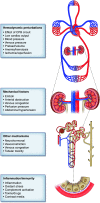Postoperative Acute Kidney Injury
- PMID: 35710717
- PMCID: PMC9528271
- DOI: 10.2215/CJN.16541221
Postoperative Acute Kidney Injury
Abstract
Postoperative AKI is a common complication of major surgery and is associated with significant morbidity and mortality. The Kidney Disease Improving Global Outcomes AKI definition allows consensus classification and identification of postoperative AKI through changes in serum creatinine and/or urine output. However, such conventional diagnostic criteria may be inaccurate in the postoperative period, suggesting a potential to refine diagnosis by application of novel diagnostic biomarkers. Risk factors for the development of postoperative AKI can be thought of in terms of preoperative, intraoperative, and postoperative factors and, as such, represent areas that may be targeted perioperatively to minimize the risk of AKI. The treatment of postoperative AKI remains predominantly supportive, although application of management bundles may translate into improved outcomes.
Keywords: Critical Care Nephrology and Acute Kidney Injury Series; acute kidney injury; biomarkers; kidney replacement therapy; perioperative; postoperative; surgery.
Copyright © 2022 by the American Society of Nephrology.
Figures


References
-
- Kork F, Balzer F, Spies CD, Wernecke KD, Ginde AA, Jankowski J, Eltzschig HK: Minor postoperative increases of creatinine are associated with higher mortality and longer hospital length of stay in surgical patients. Anesthesiology 123: 1301–1311, 2015. 10.1097/ALN.0000000000000891 - DOI - PMC - PubMed
MeSH terms
Substances
LinkOut - more resources
Full Text Sources

